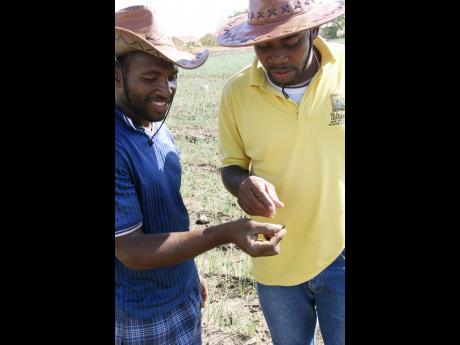Blooming bulbs - Agro-park farmers see bright future in onions
After some initial hiccups, the Yallahs Agro-Park in St Thomas is reportedly on track to provide the template for successful implementation of this intensive agricultural production system in Jamaica.
Now into its second season, some 60 farmers in five communities are cultivating about 50 acres of the onions in the park, a significant improvement over the last crop when just about 25 acres was planted.
Among those fully embracing onion cultivation is veteran farmer Gary McLean who has been in the field for some 25 years cultivating mostly cabbage, hot and sweet peppers, as well as callaloo and mangoes. McLean, a lead farmer in East Albion, which along with Phillips Field, Norris, Heartease and West Albion are involved in the agro park, is enjoying the foray into onions.
Explaining that last year only the Texas Early Grano variety of onion was cultivated, this time around, McLean has added the Arad and Mercedes onions and is very optimistic about the yield from the 0.9-acre plot where The Sunday Gleaner caught with him recently.
A number of factors - availability of affordable water, financing at affordable interest rates, technical assistance, as well as a guaranteed market for the onions at a reasonable price are among the reasons for the veteran farmer's upbeat mood.
Crop lien loans provided by the St Thomas Co-operative Credit Union represents an unconventional approach to private/public sector partnership in Jamaica and has provided opportunities for farmers who might otherwise have been denied.
"Previously, we couldn't get any loan without collateral. It was very difficult because none of us got any, but due to the intervention of AIC (Agro-Invest Corporation which operates the agro-park) and the agriculture ministry with RADA (Rural Agricultural Development Authority) and all the other agencies ... we came to an agreement as stakeholders. So them lend us based on the crop and it is good," said McLean.
Crop lien system
The crop lien system as a viable option for financial institutions has failed to take off in Jamaica due to the misguided actions of some farmers, who have failed to keep their end of the bargain. Even with a written contract outlining the terms and price of produce, many have ignored their legal obligations and sold their produce to persons, other than the entity which provided the financing for inputs and other needs.
Holly-Rose Robinson, project manager, and the rest of the team at the St Thomas Co-operative Credit Union are well aware of this but are banking on the farmers to come good and have put in place measures to help them along the way.
According to Robinson, even though there is no written agreement between RADA and the credit union, cooperation between the entities is integral to the process.
"We don't know the farmers, so each farmer who applies for a loan has to get a recommendation from RADA basically saying that they are registered with the agency and have been a farmer for two years or more. In effect, they have to convince us that the person is a serious farmer, not somebody who is going to take a loan and not do the necessary work," said Robinson.
"The extension officers are the ones who have that kind of information so they (farmers) have to get a recommendation from RADA."
Kavin Murray, one of the RADA extension officers assigned to the Yallahs Agro-Park, says his duties include the preparation of a cost of production for each farmer as part of the loan application, as well as a recommendation.
"RADA has to recommend each farmer, talk about their competence and how long they are actually in farming, specifically for the crop. So, for example, I would say this farmer is planting onion for the first time so they would know how far to go in terms of monitoring his operations," Murray pointed out.
Among those who traditionally might have been denied a loan are 27-year-old Lawrence Lynch who has put in onion on an acre and four squares of land in Heartease, and Ramon Rowe who is putting an acre and a half of onion on land in the same area, for which he has a 10-year lease.
A self-employed person who engages in fishing and landscaping, Lynch is looking to farming for the long-term financial security of his family, with a view to expanding operations, when the time is right. On the day The Sunday Gleaner team visited, Lynch had four person employed - two thinning out onion seedlings with the others replanting them.
"We haffi start from stage one and step up until we reach to where we want to reach," he declared. "I am also involved in the credit union loan as well and that also assists me greatly in terms of paying out bills and labour costs."
For Rowe, who has been cultivating callaloo, cabbage and other vegetables on a small scale for more than 10 years, the onion venture represents a chance for financial independence. A chef by profession, he is a graduate of the College of Agriculture, Science and Education and has worked in the hospitality sector.
"So I have an understanding about the farming but I've been working for other persons so now it's time for me to do something for myself," he emphasised.


